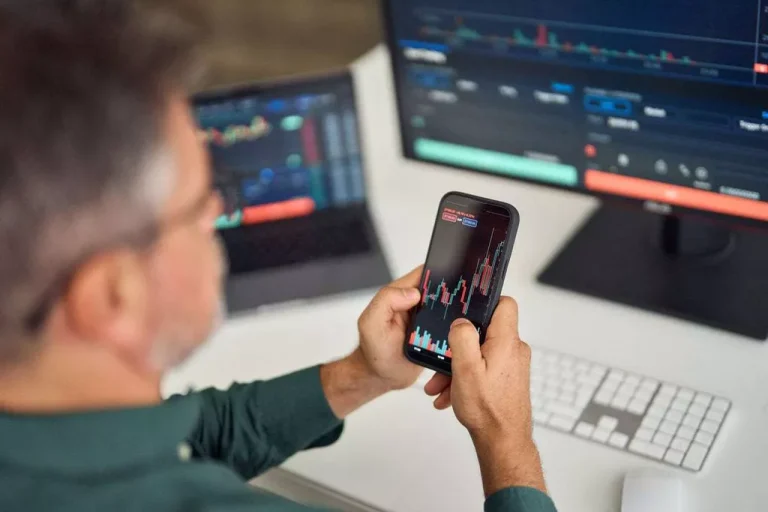FinTech
Exploring the World of Forex and Crypto Liquidity Providers
Content
Low-latency infrastructure reduces the time between trade placement and execution, which is particularly important for high-frequency traders who rely on rapid execution. Advanced technology solutions, such as https://www.xcritical.com/ FIX API, allow for fast, direct market access, making it ideal for traders using algorithms or other automated strategies. Fast execution speeds are critical in FX markets, where prices can change in fractions of a second.

How Do Financial Markets Stay Liquid?

You should be able to actively monitor transaction execution utilizing automated trading software or an app that allows you to gather comprehensive information. Trading volume, the number of market participants and the market depth influence forex market liquidity. Some providers may charge flat fees or commissions, liquidity provider vs market maker while others offer more competitive spreads. It’s essential to read the fine print to ensure no hidden costs are involved. LPs should offer fast, efficient execution, time priority, and full post-trade transparency, meeting high standards, especially during market data releases and unexpected events.
Algorithmic Trading Systems: How TickTrader Algo-Studio Can Benefit Your Brokerage
The decentralized nature of blockchain technology makes it possible for financial institutions to use smart contracts to gather precious assets and build deep liquidity pools. Essentially, they execute a customer’s order by matching them with another buyer or their own assets. A forex liquidity partner (LP) is a company that has trading assets in their own accounts to fulfill client orders from brokers. To maximize the liquidity of the forex market, LPs facilitate the transaction process by already having assets at their disposal. When brokers aren’t sure if their expected trade price will mirror the executed price, they become less hesitant to engage the market.
Which Forex brokers have the best liquidity providers?
This is essential for traders who specialize in scalping and want to secure short-term gains as quickly as possible. Liquidity providers can offer protection against market manipulation and other negative effects. Liquidity providers in Forex employ various strategies to manage the inherent risks. Liquidity in Forex (Foreign Exchange) refers to the ability to buy or sell a currency without causing significant fluctuations in its exchange rate. 20+ Liquidity Providers collaborate with Fintechee, allowing brokers and White Labels to establish connections through the FIX API connectivity offered by our FIX API Trading Platform.
Being a market maker means to act as both buyer and seller of a given asset class or exchange rate in the case of the forex market. While illiquid market conditions may arise in the forex market, the vast majority of transactions are completed expediently and in a timely manner. The notably high amount of currency market liquidity typically available allows for competitive dealing spreads and the capability of the market to absorb large orders without affecting the market. Meanwhile, your broker may be able to sell assets on your behalf without using a third-party liquidity source. This implies that instead of buying from a third party, you are buying from your broker.
In the FX market, completing trades swiftly at a price near the market value is highly significant. They connect traders to an expansive interbank market, they facilitate currency exchange and trade execution. To sum up the symbiotic dance, each party take their share of the earned fee. Online brokers charge the trader a commission while LPs earn profits when they buy or sell assets at profitable prices. Once the price and terms are satisfactory, the trade is executed, and the asset is moved.
Liquidity providers help forex brokers to offer lower spreads to their clients, they make spreads more stable when the market is volatile, and help improve the trade execution speed. LPs can influence market depth by ensuring large market orders can be fulfilled without significantly affecting security prices. To keep worldwide markets healthy, there are strong liquidity providers, market makers, and brokers. Moreover, liquidity providers contribute to market depth, meaning there are enough buy and sell orders at various price levels to accommodate various trade sizes. This depth is crucial for large institutional traders who need to execute substantial orders without drastically moving the market.
Higher liquidity ensures tight spreads, faster order execution and less price volatility. Their tools and technologies help to empower traders to improve their trading strategies. They have opened forex trading, once reserved for institutional traders, to the individual retail investor. Today millions of retail traders have access to the forex market thanks to liquidity providers. Foreign exchange LPs lend large currency pools to smaller firms for trading and order execution. They set prices and commissions and act as counterparties, excluding direct market access to traders.
- However, gaining direct access to liquidity providers and banks involves a more complex and institutional-level setup.
- Enhanced liquidity comes with the benefit of lower spreads, the difference between the ask and bid prices of assets in the market.
- It is highly recommended to work with PoP liquidity providers who deliver the broadest liquidity pools for every asset.
- As a pioneer in the industry, FXCM remains a top choice for brokers seeking reliable liquidity at competitive rates.
- ECNs provide various choices to eliminate geographical barriers for forex buyers and sellers.
- They do this by creating a representation of the market (market making) supported by quotes provided by liquidity providers.
This means that they must always provide a buy and sell price for a specific volume of standard lots at the same time. As a result, they provide liquidity and allow buyers and sellers to trade more efficiently. In this article, we’ll examine the roles, differences, and impacts of liquidity providers and market makers. Liquidity providers play a vital role in the financial markets, but their ability to offer competitive prices and services can be influenced by various factors. Trading Forex directly with liquidity providers or banks is typically referred to as “Direct Market Access” (DMA) or “Straight Through Processing” (STP) trading. However, gaining direct access to liquidity providers and banks involves a more complex and institutional-level setup.

From a single view, counterparties can monitor positions and margin utilisation, generate automated end of day trading extracts, view corporate action data and integrate real time account data via an API. FX liquidity providers are entities, often financial institutions like banks, hedge funds, and electronic communication networks (ECNs), that offer liquidity to the Forex market. They facilitate trading by providing buy and sell quotes for currency pairs at all times during trading hours. Essentially, they act as intermediaries between traders, ensuring enough buyers and sellers for transactions to occur swiftly and at competitive prices.
Some providers aggregate liquidity from multiple sources, including banks, hedge funds, and other financial structures, to provide better pricing and execution quality. Liquidity aggregation helps improve trade execution, particularly during volatile market conditions, by ensuring enough liquidity to fill orders without significant price fluctuations. Liquidity depth refers to the volume of assets available for trading at each price level.
ADS Securities is a prime broker offering their clients liquidity solutions through an extensive selection of a variety of Tier 1, Tier 2 bank, and non-bank market makers. IS Prime FX provides brokers with flexible pricing sourced from robust liquidity across more than 100 forex pairs and access to other trading instruments, including indices and commodities. The company is geographically dispersed across Europe, Asia, and the US to provide global coverage during local market hours.
Prioritise safety by finding a liquidity provider with good risk management plans and market monitoring. Liquidity providers help to avoid this by supplying liquidity to the distinct markets and thus compensating large deals of whales in order to keep the price of financial assets stable. The term “market maker” is related to players who “make the market” – i.e., banks, funds, and other institutions, while liquidity providers act as mediators between brokers and market makers. In conclusion, selecting the right liquidity provider is crucial for achieving success in forex trading. With options like FXCM PRO, B2Broker, X Open Hub, Finalto, and Global Prime, traders have access to top-tier liquidity and cutting-edge trading technology. And with the guidance and support of PT Rupiah Pay Capitals, traders can confidently navigate the forex market and unlock their full trading potential.
Both seller and buyer have uplifted their earnings from the transaction and the LP itself gets to keep a $10 commission for acting as an intermediary. Without providing liquidity, the trading marketplace is filled with deals that have a high mismatch and would never go through in a timely manner. Core liquidity providers are typically institutions or banks that underwrite or finance equity or debt transactions and then make a market or assist in the trading of the securities. High-frequency traders rely on the ability to execute trades in fractions of a second. For HFT strategies to succeed, fast and reliable access to market liquidity is critical.
In this article, we will explain liquidity, what a liquidity provider is, and how it works. Besides that, we will discuss what features a trustworthy liquidity provider offers as well as who are the best liquidity providers in the industry. Founded in 2020, Match-Prime may be a newcomer, but it packs a punch with its web-based liquidity platform and lightning-fast setup options. With over 1000 trading instruments and competitive spread margins, Match-Prime offers Forex brokers the scalability and customizability they need to thrive in today’s competitive market. These range from direct market access (DMA), advanced execution technologies, risk management tools, customization, analytics and integration services. Exotic currency pairs from emerging or smaller economies are typically less liquid.
